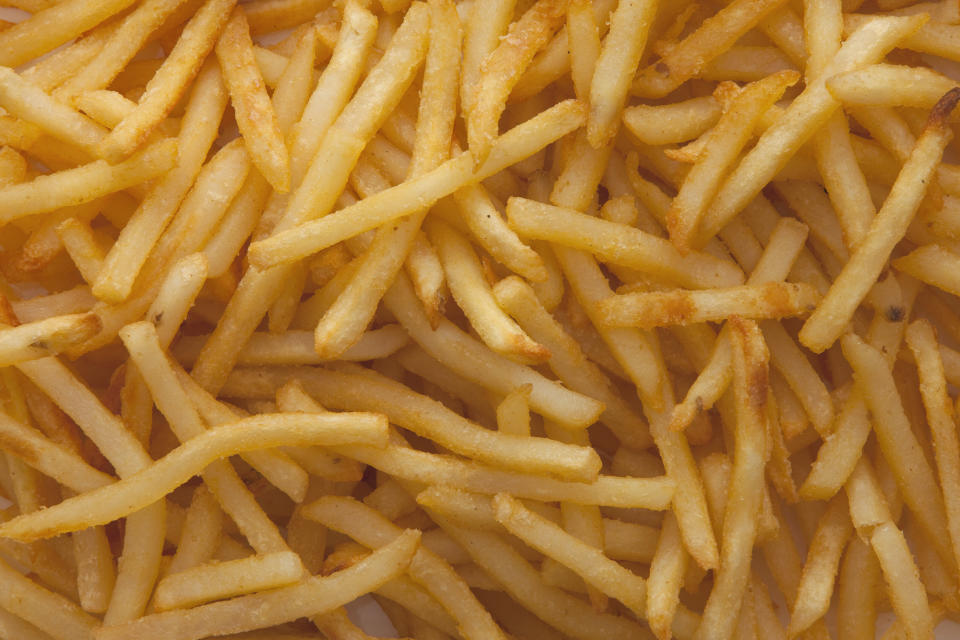
When we think about improving our brain health, we often think about mind-stimulating activities like crossword puzzles, Sudoku or Wordle. But there’s a lot more to a sharp mind than brain games: Day-to-day habits play a big role in brain health, too, starting with your diet.
Iryna Veklich via Getty Images
While occasionally indulging in certain foods that aren’t great for your brain is fine, there are popular (and admittedly delicious) foods and beverages that people who specialize in brain health — like neurologists and neuroscientists — do their very best to avoid. Here are seven of them.
Protein powder
Anna Blazhuk / Getty Images
In the habit of adding a scoop of protein powder to your daily smoothie? You may want to stop, or at the very least, check the ingredients. While protein powder is often marketed as a healthy, lower-calorie option for people trying to lose or maintain weight, a lot of them are filled with artificial sweeteners, according to neuroscientist Friederike Fabritius.
“It is those additives that really give me pause when it comes to protein powders because they wreak havoc on your gastrointestinal microbiome,” Fabritius said. “A healthy and robust internal microbiome is so important for great brain health because most of our neurotransmitters are produced in the gut.”
Soda
Virojt Changyencham / Getty Images
Sorry, soda drinkers. Neurologist Dr. Shaheen Lakhan says your favorite bubbly beverage is just flat-out bad for your brain. “Soda is one of the worst foods for brain health due to the high concentration of simple sugars, which damage the blood vessels supplying the brain,” he said. “Over time, this starves the brain from the very fuels it needs to function, leading to premature dementia and strokes. Acutely, sugar also causes brain inflammation, irritability, poor mood and sleep disturbances.”
Plus, the constant highs and lows (the proverbial sugar “rush” and “crash”) can also cause a state of addiction with cravings and withdrawals — and diet soda is no better. “Even diet or zero versions of soda have negative effects, as the calorie-free additives stress out the brain and trick it into consuming more calories and craving real sugar,” he said.
Margarine
Frank Muckenheim / Getty Images/Westend61
Down with fake butter! Dr. Shae Datta, a neurologist and co-director of the NYU Langone Concussion Center, said she avoids margarine as much as possible because it contains trans fats. (Though it should be noted that there are butter alternatives without trans fats, so take a close look at the ingredients list.)
“We often hear that trans fats aren’t good for your heart and blood vessels. The same applies to the vessels of the brain,” she said. “A study from the journal Neurology found that older adults who had the highest levels of elaidic acid (a common type of trans fat) in their blood were more likely to develop dementia. Better to stick to olive oil and real butter.”
Cannabis-infused foods
Torriphoto / Getty Images
With the rise of CBD and the legalization of marijuana in most states, this one might come as a bit of a surprise. But just because cannabis is legal and can help you relax doesn’t mean it’s doing great things for your brain.
“Besides the short-term cognitive impairing effects of cannabis, tetrahydrocannabinol (also known as THC, or what produces the ‘high’) appears to constrict arteries in the brain,” said Dr. Lester Leung, a neurologist and the director of the Comprehensive Stroke Center at Tufts Medical Center. “This can be very dangerous when used in large amounts by people with migraines, a very common headache condition that, together with heavy cannabis use, can lead to stroke, even in young, otherwise healthy people.”
Beer
Angelo Desantis / Getty Images
“Beer is comprised completely of empty calories with no nutritional value,” said Dr. Byran Ho, a neurologist and director of the Movement Disorders Program at Tufts Medical Center. “Alcohol is a neurotoxin that can injure both the central and peripheral nervous system, even if consumed in moderate amounts.”
Decaf coffee
Stefania Pelfini, La Waziya Phot / Getty Images
If you’re a fan of decaf, Sean Callan, a neuroscientist and CEO of Ellipse Analytics, recommends you skip this jolt-free beverage unless you’re sure the decaffeination process is solvent-free.
“Solvents, the chemicals used to remove caffeine from coffee, are generally toxic to humans,” he said. “Many are linked to increased risk of cancer or neurological harm, especially in large or repeated doses. Beyond that, solvents like methylene chloride (a solvent commonly used in the decaffeination process) are known to cross the placenta, meaning pregnant women risk exposing their unborn child to the solvent.”
If you still want to enjoy decaf coffee, Callan recommends you visit the site checkyourdecaf.org, where you can find out what chemicals are in any decaf brands you drink.
French fries
Mike Kemp via Getty Images
Here’s another bummer: French fries are one of the main foods neurologist Dr. Pedram Navab avoids. “A diet that incorporates fatty foods like French fries can damage blood vessels that supply the brain, causing cognitive impairment,” he said. “It reduces the blood-brain barrier (BBB) integrity and leads to neuronal damage of the hippocampus, a part of the brain that is instrumental for learning and memory.”
While some of these foods may be easier to cut out — looking at you, protein powder and decaf coffee — some might be a bit harder. So remember to consume any favorite foods and beverages that may damage brain health in moderation, and when possible, opt for a healthier version of it.This article originally appeared on HuffPost.

 2 days ago
2
2 days ago
2

















 English (US)
English (US)